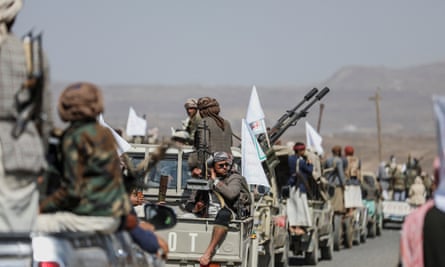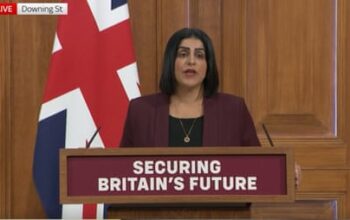The White House national security adviser cautioned that the recent US airstrikes against Iranian-supported militias in the Middle East were only the first step in an ongoing retaliatory action and did not rule out the possibility of further strikes on Iranian territory.
According to Jake Sullivan, the recent strikes on 85 locations in Iraq and Syria were carried out in response to the deaths of three US soldiers. He stated that these strikes were just the start of their reaction and there will be additional measures taken, some of which may be visible while others may not, to send a strong message that any attack or loss of American lives will be met with a strong and decisive response.
During an interview on NBC, Sullivan declined three opportunities to deny the possibility of airstrikes on Iran following separate US and UK attacks on Houthi targets in Yemen. This potential escalation is something that the US has been actively trying to avoid.
Prominent leaders within the Iraqi government, who have strong ties to Iran, called for the removal of US military forces from their country. They argued that the actions of Washington were pushing the region towards a dangerous situation. The United States’ airstrikes will be discussed during an urgent meeting of the United Nations Security Council in New York on Monday. American diplomats are anticipated to defend the strikes as a necessary act of self-defense, emphasizing that their presence in Iraq is at the request of the Iraqi government.
The American Secretary of State, Antony Blinken, embarked on his fifth journey to the area on Sunday following Hamas’s attack on Israel on October 7th. His goal is to once again try to negotiate a hostage release agreement and remove obstacles hindering aid from reaching Gaza, as the conflict approaches its fifth month.
Iran cautioned the US against taking action towards the Behshad, an Iranian vessel located in the Red Sea. The US suspects the ship of gathering surveillance data to aid in directing Houthi attacks on merchant ships in the region.
Iran announced that the vessel was “positioned in the Red Sea with authorized coordination from the International Maritime Organization to safeguard Iranian ships from pirate threats.” Tehran warned that any aggression towards the ship would be the responsibility of those who initiated the action.
The caution from Iran was issued following a series of attacks by the US and UK, targeting 36 Houthi locations in Yemen on Saturday evening. In response, the Tehran-supported militia group has declared their intention to persist in targeting commercial ships in the Red Sea as a show of support for Palestinians in Gaza.
Six other nations, such as Canada, the Netherlands, and Bahrain, aided in the assault. The United States reported that the attacks were aimed at 13 different areas in Yemen and successfully destroyed hidden armament storage sites, missile systems, launchers, and other resources that the Houthis had been using to target ships in the Red Sea.
On Sunday night, UK Prime Minister Rishi Sunak stated that the strikes were done in self-defense and he would not hesitate to safeguard the lives of British citizens.
During his visit to Northern Ireland, he stated that following the previous round of strikes, there have been ongoing attacks by the Houthis on ships in the Red Sea.
This behavior is clearly unacceptable and against the law. It endangers the lives of innocent individuals and has negative effects on the economy. It also involves assaults on vessels connected to Britain. As a result, we have taken action in order to protect ourselves, in a reasonable manner and in collaboration with our allies.
I have made it known that I am prepared to defend the safety of British citizens and their interests. Our main goal in our diplomatic actions is to promote peace and reduce tensions in the region.
On January 11 and 22, the United States and United Kingdom coordinated their efforts and carried out joint attacks.
The ongoing conflict between the US and Iran is centered around the US’s efforts to control Tehran’s influence on allied forces in the region. Iran, on the other hand, is determined to support these forces in order to pressure the US to withdraw from the region and prevent the destruction of Hamas in Gaza.
Both Washington and Tehran are hesitant to engage in direct confrontation. Tehran has drawn a boundary by warning the US against launching any direct strikes on Iranian territory, a strategy supported by numerous US Republicans.
Lloyd Austin, the US Secretary of Defense, stated that this joint effort serves as a strong warning to the Houthis. They will face additional repercussions if they do not cease their unlawful assaults on global shipping and naval vessels.
Grant Shapps, the UK’s equivalent, stated: “The Houthis’ actions of targeting commercial and military ships in the Red Sea are illegal and unacceptable. It is our responsibility to safeguard innocent lives and maintain the right to navigate freely.”
This is the reason for the Royal Air Force’s involvement in a third round of precise and strategic attacks on Houthi military sites in Yemen.
This is not a escalation. We have previously effectively targeted launchers and storage sites related to Houthi assaults, and I am sure that our recent attacks have additionally weakened the Houthis’ abilities.
Yahya Sarea, the military spokesperson for the Houthis, stated that there will be a response and consequences for the strikes. The Houthis reported a total of 48 attacks, with 13 occurring in the capital city of Sana’a.

There is disagreement among military and diplomatic professionals about the potential impact of the attacks on the Houthis’ strength in both the Red Sea region and northern Yemen, specifically in Sana’a. The Houthis, who receive support and guidance from Iran but are not completely controlled by them, believe they have gained influence in the Middle East by showing support for the Gaza population.
The strikes have effectively discouraged commercial ships from utilizing a highly trafficked waterway, resulting in increased transportation expenses and insurance rates.
The bombing in Yemen is happening at the same time as the US’s ongoing response to multiple attacks on military bases in Iraq, Jordan, and Syria. The initial round of bombings on Friday targeted areas associated with Iran’s Islamic Revolutionary Guard Corps and the militias it supports, resulting in the reported deaths of around 40 individuals.
The recent attacks in Iraq, which were anticipated by the Pentagon for a week, do not seem to have caused any casualties among Iranian military advisors. The main targets of the strikes were storage facilities belonging to the Islamic Resistance in Iraq, an overarching organization for militias operating in the region.
At this point, Sullivan stated that he was not ready to disclose specific information about the harm caused by the United States.
Iraq’s security advisor, Qasim al-Araji, stated that this strike will have a detrimental impact on the security of Iraq and the surrounding region. He also believes that it goes against the efforts to achieve stability.
Last week, Araji met with Abu Idris al-Sharafi, the special envoy for Houthi leader Abdul-Malik al-Houthi, indicating Iraqi support. During the meeting, both parties acknowledged that the ongoing conflict in Gaza is the cause of escalating tensions in the region. They also emphasized the need to end the war and alleviate the suffering of the Palestinian people before it leads to further consequences.
Shortly after the US attacks, the Islamic Resistance announced that it had attacked three US bases in Syria and Iraq. These included the al-Tanf bases located at the border triangle where Jordan, Iraq, and Syria meet, as well as a base in Erbil, located in northern Iraq.
Source: theguardian.com


